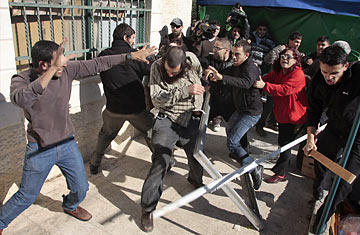
Jewish settlers, center and left, scuffle with Palestinians and activists outside a house in the East Jerusalem neighborhood of Sheikh Jarrah
On the face of it, the project sounds innocent enough: Since the early 1990s, the Israeli organization Elad has been rehabilitating the City of David, a once neglected area nestled at the foot of the southern walls of Jerusalem's Old City. The site is believed to have been the seat of power of the kingdom of David, before King Solomon built his temple higher up on Mount Moriah. Until a few years ago, only a few thousand tourists a year visited the City of David, but Elad's efforts — digging tunnels, uncovering ruins and building a visitor's center — drew at least 460,000 people to the site last year. The organization hopes to make its project the flagship of a series of religious and historical theme parks in a loose ring around the Old City to boost its appeal as a tourist destination. But the enterprise also has a potentially explosive ideological purpose: to cement Israel's claim to all of Jerusalem — a claim that is hotly and often violently disputed by Palestinians and the wider Muslim world.
A 15 minute 3-D film at the City of David visitors' center, narrated by a fictional Israeli Indian Jones–type character named Amos (armed with a "shovel and a Bible"), never mentions Christianity or Islam and ends by proclaiming that "neighborhood by neighborhood, Jerusalem is renewed as the eternal capital of Israel." The problem is that Jerusalem was not always the capital of Israel — the city was ruled for centuries by Christian and Muslim empires. Today, its status remains disputed. The City of David and the Old City are located in predominantly Arab East Jerusalem, which was captured by Israel from Jordan during the war of 1967, although its right to sovereignty over that portion of the city is not recognized by the international community. The Oslo Accords of 1993, aimed at creating two states, designated Jerusalem a "final status" issue for negotiation between Israel and the Palestinians, and it has been a working assumption of all peace efforts since that a formula would have to be found for sharing the city — which the Palestinians claim as their future capital.
The Obama Administration is insisting that the two sides resume negotiations on Jerusalem and other final-status issues, but the government of Israeli Prime Minister Benjamin Netanyahu refuses to even discuss Jerusalem, while the Palestinian side refuses to talk until Israel halts all settlement construction, including any construction in East Jerusalem. Amid the stalemate, private Israeli groups like Elad are continuing their efforts to expand Jewish settlements in Arab neighborhoods, some with the goal of preventing any Israeli government from giving up East Jerusalem in a final peace deal.
Today, with the peace process on the brink of collapse, East Jerusalem is becoming the central political battleground pitting Israel against both the Palestinians and Western governments hoping to salvage a two-state solution. That much is visible at the City of David. Although billboards in the area portray white gleaming Jewish faces in ancient and modern times, the City of David sits in the center of a predominantly Arab neighborhood, Silwan. Many people originally worked on the site as laborers, but the 40,000 Arab residents of Silwan have grown to resent the City of David and the few hundred Jewish settlers who have since moved into the neighborhood along with their armed guards. Palestinian religious authorities have complained that the Israeli archaeological digs are insensitive to the relics of earlier Islamic eras and worry about possible damage to the al-Aqsa Mosque, which rises just above Silwan on the Temple Mount. Proclaimed as the third holiest site in Islam, it is the singular symbol of the Palestinian plight throughout the Muslim world. Tensions are rising as the Jerusalem municipality has begun destroying 88 homes in Silwan in order to make way for an archaeological park. Earlier this year, riots broke out in the Old City when an Islamist movement based among Israeli Arabs accused Israel of threatening the mosque.
The continuing destruction of Arab homes, and the Israeli government's refusal to stop settlements in East Jerusalem, has sparked criticism from the U.N., the U.S. and the E.U., to the extent that this week E.U. foreign ministers are considering a Swedish proposal to recognize Palestinian claims on East Jerusalem as a future capital.
But Israeli peace activists say that even the Western powers aren't paying enough attention to the ideological agenda of settler groups in Jerusalem, which has helped turn a difficult nationalistic conflict into an even more volatile religious conflict. In today's desperate atmosphere, any real or perceived damage done to the nearby Islamic holy places could help spark another Palestinian uprising. "In responsible hands, Jerusalem is a message of peace from Beirut to Baghdad," said Danny Seidemann, an Israeli lawyer who tracks East Jerusalem settlements. "But in irresponsible hands, it's a nuclear bomb that can send shock waves throughout the region."
— With reporting by Aaron J. Klein / Jerusalem and Jamil Hamad / Bethlehem
